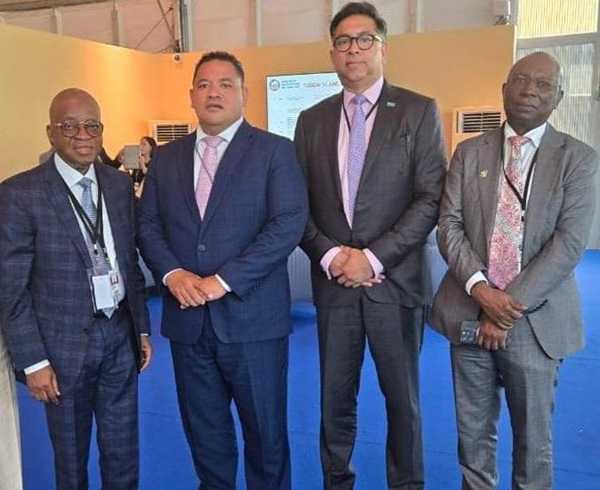
In a strategic diplomatic push at the 2025 United Nations Ocean Conference held in Nice, France, Nigeria’s Minister of Marine and Blue Economy, Adegboyega Oyetola, met with leaders from various island nations to secure support for Nigeria’s bid for election into Category C of the International Maritime Organisation (IMO) Council later this year.
During the high-level engagements, Oyetola held separate talks with the Prime Minister of Papua New Guinea, Honourable James Marape; Saint Kitts and Nevis’ Minister of Sustainable Development, Dr. Joyelle Clarke and Tuvalu’s Minister of Home Affairs, Climate Change and Environment, Dr. Maina Vakafua Talia.
These meetings reflected Nigeria’s commitment to forging meaningful alliances with nations that share common challenges and aspirations within the global maritime sector, despite geographical distances.
The minister emphasised that Nigeria’s quest for a seat on the IMO Council goes beyond national ambition. Instead, it aims to amplify the voices of African nations, developing economies and vulnerable coastal and island states in key maritime governance spaces. He assured that Nigeria would be a dependable partner, advocating for stronger global action on maritime decarbonisation and sustainable ocean governance.
Oyetola underscored that President Bola Tinubu’s establishment of the Ministry of Marine and Blue Economy in 2023 demonstrates Nigeria’s renewed dedication to sustainable maritime management, climate resilience, and blue economy development. He explained that the country is rethinking its relationship with its vast marine resources through initiatives focused on port modernisation, maritime security, ocean sustainability and improving livelihoods in coastal communities.
He stated that Nigeria seeks support not merely as a candidate but as a committed partner ready to collaborate with island nations and other vulnerable states to push for fairer maritime policies. He pledged that Nigeria would actively use its vote and influence on the IMO Council to champion the interests of developing nations and small island states that are often on the frontlines of climate change impacts.
Oyetola reiterated Nigeria’s readiness to advocate for a more equitable maritime regulatory environment that recognises varying national capacities, promotes accessible climate-smart shipping technologies and encourages practical cooperation in building resilient blue economies.
He assured his counterparts that Nigeria would remain a strong, credible voice for inclusive and balanced maritime governance, working alongside island nations to address shared challenges and advance mutual priorities.
As the IMO Council elections draw near, Nigeria positions itself as a proactive Category C candidate committed to equity, sustainability, and amplifying the representation of developing and climate-vulnerable nations within the global maritime community.

